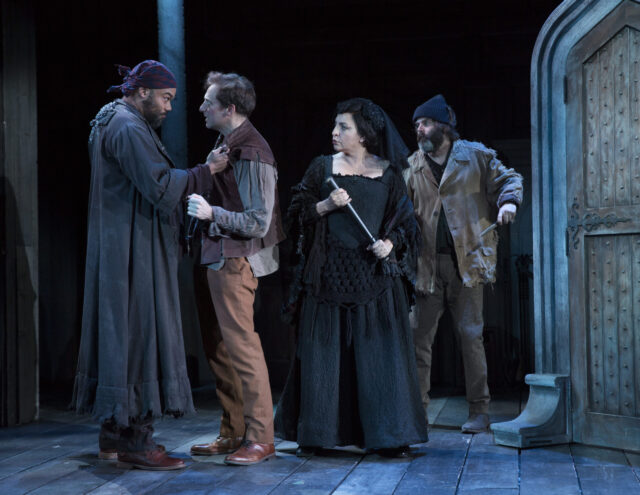
Arden (Thomas Jay Ryan) has no idea his wife, Alice (Cara Ricketts), is planning to have him murdered in true-crime thriller (photo by Carol Rosegg)
ARDEN OF FAVERSHAM
Lucille Lortel Theatre
121 Christopher St. between Bleecker & Hudson Sts.
Monday – Saturday through April 1, $77-$112
212-352-3101
www.redbulltheater.com
Red Bull Theater turns to true crime in its devilishly delightful adaptation of the Jacobean-Elizabethan comic noir Arden of Faversham, continuing through April 1 at the Lucille Lortel. Company founding artistic director Jesse Berger and Jeffrey Hatcher previously collaborated on 2017’s hilarious The Government Inspector and 2021’s overwrought The Alchemist. Joined by Kathryn Walat, they now bring back Arden of Faversham — the authorship of which is unknown, with historians debating whether it was written by some combination of Thomas Kyd, Christopher Marlowe, Thomas Watson, and William Shakespeare — a rousing romp of love, lust, and class warfare.
The late-sixteenth-century play was inspired by the real-life story of an unfaithful wife’s attempts to murder her wealthy husband with the help of her lover and others. Alice (Cara Ricketts) is tired of her plain, boring spouse, Arden (Thomas Jay Ryan), and has fallen into the arms of a dashing local tailor, Mosby (Tony Roach). Although Arden and his best friend, Franklin (Thom Sesma), suspect something illicit is going on right under their nose, Alice denies it when Arden confronts her. Meanwhile, Susan (Emma Geer), Alice’s maid and Mosby’s sister, is trying to decide between two suitors, the ostentatious painter Clarke (Joshua David Robinson) and the awkward Michael (Zachary Fine), Arden’s timid and clumsy servant.
“It is not love that loves to anger love,” Mosby tells Alice, who answers, “It is not love that loves to murder love.”
Alice and Mosby concoct several plots to take care of their wicked business, enlisting the widow Greene (Veronica Falcón), who believes Arden has stolen her property following her husband’s death; notorious thieves Big Will (David Ryan Smith) and Shakebag (Haynes Thigpen); and Susan, Clarke, and Michael. Mayhem ensues as an unaware Arden keeps avoiding his fate in very funny ways.

A motley crew has been put together for nefarious purposes in Arden of Faversham (photo by Carol Rosegg)
The domestic tragedy takes place on Christopher and Justin Swader’s dark, ominous set, a lush dining room with a fireplace in Arden’s estate that transforms into the front of Franklin’s house and a foggy dock with the clever use of a few props and Reza Behjat’s moody lighting. Mika Eubanks’s period costumes range from Alice’s lovely gowns and Clarke’s absurd finery to the thieves’ sloppiness and Arden’s fur-lined cloak; several characters have modern-day clothing underneath, as well as contemporary shoes, furthering the farce.
Ricketts (Time and the Conways, Measure for Measure) is both alluring and goofy as the conniving Alice; early on, she tells Mosby, “Base peasant, get thee gone, / And boast not of thy conquest over me, / Gotten by witchcraft and mere sorcery.” She also believes, “Love is a god, and marriage is but words.”
Ryan (Dance Nation, Eureka Day), one of New York’s finest character actors, is a riot as her much-put-upon spouse, Arden, a cuckold who exists in a bubble; Sesma (A Man of No Importance, Letters of Suresh) is stalwart as Arden’s dedicated defender, who has a crush on his bestie; Geer (Hindle Wakes, Mary Page Marlow) brings a sweet innocence to Susan; and Fine (Vanity Fair, Coriolanus) once again displays his comic chops as the quirky, uncomfortable Michael.

The plot thickens as Mosby (Tony Roach), Arden (Thomas Jay Ryan), and Alice (Cara Ricketts) share a toast (photo by Carol Rosegg)
Berger (Volpone, ‘Tis Pity She’s a Whore), Hatcher (A Picasso, Tuesdays with Morrie), and Walat (Creation, Bleeding Kansas) take plenty of liberties with the original story — for example, farmer Greene becomes widow Greene in this adaptation, and Susan is fleshed out significantly, both of which are excellent changes, giving women more agency — and it mostly works, save for a few grisly over-the-top scenes that push things a bit too far.
Did Shakespeare write any of Arden of Faversham? I have no idea, although the names of the thieves, Will and Shakebag, are curious. “It’s daunting to revise a play that Shakespeare may have cowritten. It seems presumptuous,” Hatcher and Walat explain in a program note. Presumptuous as that might be, it’s certainly more than worthwhile in this case.


